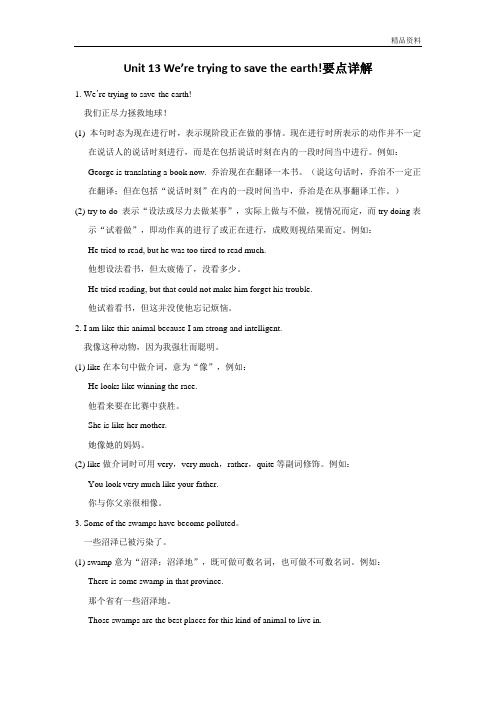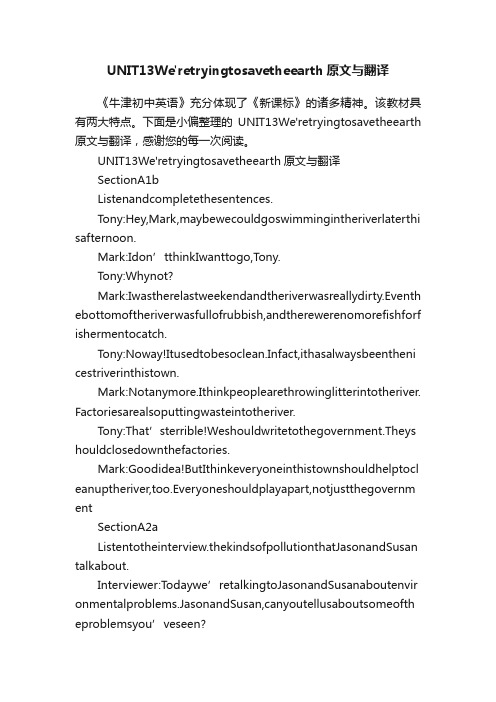九年级英语全册Unit13We’retryingtosavetheearth第1课时习题课件新版人教新目标版
- 格式:ppt
- 大小:1.26 MB
- 文档页数:17

Unit 13 We’re trying to save the earth!要点详解1. We’re trying to save the earth!我们正尽力拯救地球!(1) 本句时态为现在进行时,表示现阶段正在做的事情。
现在进行时所表示的动作并不一定在说话人的说话时刻进行,而是在包括说话时刻在内的一段时间当中进行。
例如:George is translating a book now. 乔治现在在翻译一本书。
(说这句话时,乔治不一定正在翻译;但在包括“说话时刻”在内的一段时间当中,乔治是在从事翻译工作。
)(2) try to do 表示“设法或尽力去做某事”,实际上做与不做,视情况而定,而try doing表示“试着做”,即动作真的进行了或正在进行,成败则视结果而定。
例如:He tried to read, but he was too tired to read much.他想设法看书,但太疲倦了,没看多少。
He tried reading, but that could not make him forget his trouble.他试着看书,但这并没使他忘记烦恼。
2. I am like this animal because I am strong and intelligent.我像这种动物,因为我强壮而聪明。
(1) like在本句中做介词,意为“像”,例如:He looks like winning the race.他看来要在比赛中获胜。
She is like her mother.她像她的妈妈。
(2) like做介词时可用very,very much,rather,quite等副词修饰。
例如:You look very much like your father.你与你父亲很相像。
3. Some of the swamps have become polluted。
一些沼泽已被污染了。

人教版英语九年级全册Unit 13We're trying to save the earth! SectionB (2a-2e)教案人教版九年级全册Unit 13 We're trying to save the earth! Section B (2a-2e)教案I. Objectives:By the end of this lesson, students will be able to:Discuss environmental issues and solutions in English.Provide suggestions for saving the earth.Understand the use of passive voice in the context of environmental problems.II. Materials:Student textbook: Unit 13 “We’re trying to save the earth!” Section B. Whiteboard or blackboard and markers/chalk.Pictures or videos related to environmental problems.III. Procedure:Warm-up:Begin the class by showing pictures or videos related to environmental problems such as air pollution, deforestation, or plastic waste.Ask students to name the environmental problems they see and discusstheir causes and potential solutions as a class.Presentation:Introduce the topic of the lesson: environmental problems and solutions. Review the vocabulary related to the environment and add any necessary new vocabulary on the board.Discuss the use of passive voice in talking about environmental issues. Practice: (15 minutes)a. Activity 1: Vocabulary ReviewHave students work in pairs or small groups to match the vocabulary words with their definitions or examples. Use flashcards or a worksheet for this activity.b. Activity 2: Group DiscussionDivide the class into groups of four or five.Provide each group with a list of environmental problems (air pollution, water pollution, deforestation, etc.).Ask each group to discuss the causes and effects of the assigned problem and brainstorm possible solutions.Encourage students to use the passive voice when discussing the problems and solutions.Production:Hand out Worksheet 2a from the textbook to each student.Instruct students to complete the sentences using the correct passiveforms of the verbs in brackets.Allow students to work individually or in pairs to complete the task. Review the answers as a class and provide feedback.Consolidation:Conduct a class discussion and ask students to share their suggestions on how they can contribute to saving the earth.Encourage students to provide specific actions they can take individually or as a group.Summarize the key points discussed in the class and emphasize the importance of everyone’s efforts in saving the earth.Wrap-up:Assign Homework: Ask students to write a short paragraph about one environmental problem they are most concerned about and one solution they suggest.Recap the main points of the lesson and remind students to complete their homework.Assessment:Assess students based on their participation in group discussions, completion of the worksheet, and the quality of their homework assignment.Role Play:Divide the class into pairs or small groups.Assign each group a scenario related to an environmental problem (e.g., a discussion between a factory owner and an environmentalist, or a debate between two friends about the use of single-use plastics). Instruct students to prepare and perform a role play based on their assigned scenario.Encourage students to use the passive voice and express different perspectives on the issue.Research Project:Assign each student or group a specific environmental problem to research.Instruct students to gather information, statistics, and examples related to the problem.Ask students to create a presentation or poster to share their findings with the class.Provide time for students to present their research and discuss possible solutions.Writing Task:Ask students to write a persuasive letter to a local government official, addressing an environmental problem in their community.Instruct students to explain the issue, its impact, and propose specific actions or policies that can help solve the problem.Encourage students to use persuasive language and provide evidence tosupport their arguments.Homework:Review the vocabulary words related to the environment.Research and write a short essay on one global environmental issue, its causes, and its potential impact on the world. Includesuggestions for how individuals and governments can address the issue.。




UNIT13We'retryingtosavetheearth原文与翻译《牛津初中英语》充分体现了《新课标》的诸多精神。
该教材具有两大特点。
下面是小偏整理的UNIT13We'retryingtosavetheearth 原文与翻译,感谢您的每一次阅读。
UNIT13We'retryingtosavetheearth原文与翻译SectionA1bListenandcompletethesentences.Tony:Hey,Mark,maybewecouldgoswimmingintheriverlaterthi safternoon.Mark:Idon’tthinkIwanttogo,Tony.Tony:Whynot?Mark:Iwastherelastweekendandtheriverwasreallydirty.Eventh ebottomoftheriverwasfullofrubbish,andtherewerenomorefishforf ishermentocatch.Tony:Noway!Itusedtobesoclean.Infact,ithasalwaysbeentheni cestriverinthistown.Mark:Notanymore.Ithinkpeoplearethrowinglitterintotheriver. Factoriesarealsoputtingwasteintotheriver.Tony:That’sterrible!Weshouldwritetothegovernment.Theys houldclosedownthefactories.Mark:Goodidea!ButIthinkeveryoneinthistownshouldhelptocl eanuptheriver,too.Everyoneshouldplayapart,notjustthegovernm entSectionA2aListentotheinterview.thekindsofpollutionthatJasonandSusan talkabout.Interviewer:T odaywe’retalkingtoJason andSusanaboutenvir onmentalproblems.JasonandSusan,canyoutellusaboutsomeofth eproblemsyou’veseen?Jason:Ithinkoneproblemisthattheairisbadlypolluted.Ihardlye verseeblueskiesanymore.Susan:Yes,andIusedtoseethestarsclearly.Interviewer:Whatdoyouthinkhascausedthisproblem?Susan:Well,therearemorecarsontheroadthesedays.Jason:Andfactoriesthatburncoalalsopollutetheairwithalotofb lacksmoke.Interviewer:Whatotherproblemsdoyousee?Susan:Iguessthere’stoomuchrubbishandwasteinthestreets.Jason:Yes!Everydaypeoplearethrowingawaythingslikewoode nchopsticks,plasticbowlsandplasticbags.Susan:They’realsolitteringinpublicplaces,forexample,durin gpicnicsinparks.Thisisturningbeautifulplacesintouglyones.Interviewer:You’reright.Theseareseriousproble msforourenv ironment.Next,let’stalkaboutthethingswecandotohelp.SectionA2bListenagainandcompletethesentences.Interviewer:T odaywe’retalkingtoJasonandSusanaboutenvir onmentalproblems.JasonandSusan,canyoutellusaboutsomeofth eproblemsyou’veseen?Jason:Ithinkoneproblemisthattheairisbadlypolluted.Ihardlye verseeblueskiesanymore.Susan:Yes,andIusedtoseethestarsclearly.Interviewer:Whatdoyouthinkhascausedthisproblem?Susan:Well,therearemorecarsontheroadthesedays.Jason:Andfactoriesthatburncoalalsopollutetheairwithalotofb lacksmoke.Interviewer:Whatotherproblemsdoyousee?Susan:Iguessthere’stoomuchrubbishandwasteinthestreets.Jason:Yes!Everydaypeoplearethrowingawaythingslikewoodenchopsticks,plasticbowlsandplasticbags.Susan:They’realsolitteringinpublicplaces,forexample,d urin gpicnicsinparks.Thisisturningbeautifulplacesintouglyones.Interviewer:You’reright.Theseareseriousproblemsforourenv ironment.Next,let’stalkaboutthethingswecandotohelp.SectionA2dRoleplaytheconversation.JasonandSusan,whatareyourideasforsolvingtheseproblems?Well,tocutdownairpollution,weshouldtakethebusorsubwayin steadofdriving.Yeah,orrideabike.Thereareotheradvantagesofbikeriding.It'sg oodforhealthitdoesn'tanythingGreatideas!Whataboutwastepollution?Mmm,Ithinksimplethingslikebringingabagtogoshoppingcan help.Istarteddoingthatayearago.Me,tooAlso,Inevertakewoodenchopsticksorplasticforkswhen Ibuytakeawayfood.Iusetheonesathome.Andremembertothrowrubbishinthebinsandkeeppublicplace scleanandbeautifulforeveryone.Sotogether,ouractionscanmakeadifferenceandleadtoabetter future!SectionA3aReadthepassageaboutsharksandcompletethefactsheetbelow.SavetheSharks!Manyhaveheardofsharkfinsoup.Thisfamousandexpensivedis hisespeciallypopularinsouthernChina.Butdoyourealizethaty ou’r ekillingawholesharkeachtimeyouenjoyabowlofsharkfinsoup?Whenpeoplecatchsharks,theycutofftheirfinsandthrowthesha rkbackintotheocean.Thisisnotonlycruel,butalsoharmfultotheenvir onment.Withoutafin,asharkcannolongerswimandslowlydies.Sharksar eatthetopofthefo odchainintheocean’secosystem.Iftheirnumber sdroptoolow,itwillbringdangertoalloceanlife.Manybelievethatsharkscanneverbeendangeredbecausethey arethestrongestintheirfoodchain.Butinfact,around70millionshark sarecaughtandtradedinthisindustryeveryyear.Thenumbersofsomekindsofsharkshavefallenbyover90percen tinthelast20to30years.Environmentalprotectiongroupsaroundthe world,suchasWildAidandtheWWF,areteachingthepublicabout“fi nning”.Theyhaveevenaskedgovernmentstodeveloplawstostopthesal eofsharkfins.Sofar,noscientificstudieshaveshownthatsharkfinsare goodforhealth,sowhyeatthem?Helpsavethesharks!SectionB1cListenandcheck(√)thethingsthatJuliaandJacktalkabout.Jack:Turnoffthelights,Julia.Itsaveselectricity.Julia:Oh,Iusuallydothat.Iwasjustinahurry.Jack:Isee.I’vejustreadabookwh ichgivesideasabouthowweca nsavetheenvironment.Forexample,youshouldturnofftheshowerw henyou’rewashingyourhair.Julia:Oh,Iwouldneverdothat.Ihaveveryshorthair.Itonlytakesaf ewminutestowash.Whatelsedoesitsay?Jack:Youshouldtakeyourownbagswhenyougoshopping.Julia:Oh,that’seasy.I’lldothatfromnowon.Whatelse?Jack:Peopleshouldstopridingincarsandstartridingbikes.Julia:Noway!Itwouldtakeme45minutestogettoschoolbybike!Jack:Butit’sgoodfortheenvironment!Besides,Ilikeridingmybi ke.Julia:Yes,andyoualsoliveclosetoschool!SectionB1dListenagain.Check(√)thethingsthatJuliaisdoingnow,thethings shewilldointhefutureandthethingsshewouldneverdo.Jack:Turnoffthelights,Julia.Itsaveselectricity.Julia:Oh,Iusuallydothat.Iwasjustinahurry.Jack:Isee.I’vejustreadabookwhichgiveside asabouthowweca nsavetheenvironment.Forexample,youshouldturnofftheshowerw henyou’rewashingyourhair.Julia:Oh,Iwouldneverdothat.Ihaveveryshorthair.Itonlytakesaf ewminutestowash.Whatelsedoesitsay?Jack:Youshouldtakeyourownbagswhenyougoshopping.Julia:Oh,that’seasy.I’lldothatfromnowon.Whatelse?Jack:Peopleshouldstopridingincarsandstartridingbikes.Julia:Noway!Itwouldtakeme45minutestogettoschoolbybike!Jack:Butit’sgoodfortheenvironment!Besides,Ilikeridingmybi ke.Julia:Yes,andyoualsoliveclosetoschool!SectionB2bReadthepassageandcompletethechartbelow.Rethink,Reuse,Recycle!Doyouoftenthrowawaythingsyoudon’tneedanymore?Have youeverthoughtabouthowthesethingscanactuallybeputtogoodu se?Nothingisawasteifyouhaveacreativemind.Youhaveprobablyn everheardofAmyHayes,butsheisamostunusualwoman.Shelivesin ahouseintheUKthatshebuiltherselfoutofrubbish.Thewindowsanddoorscomefromoldbuildingsaroundhertow nthatwerepulleddown.Thetopofthehouseisanoldboatturnedupsi dedown.Andthegateinfrontofherhouseismadeofrocksandoldglas sbottles.AmyrecentlywonaprizefromtheHelpSaveOurPlanetSociety.Thepresidentsaid,“Amyisaninspirationtousall.”Amyisn’ttheonlyonewhoisgoodatrecycling.JessicaWongfro mHongKongusesoldclothesthatpeop ledon’twearanymoretoma kebags.Shehasbeendoingthisforafewyearsnow.Sheopenedasmallshopwhereshesellsherbags,andshehasalso setupawebsitetosellthemonline.Sheespeciallylikestouseoldjeanst omakehandbags.Herbagsarecuteanduseful.“Iplantowriteabookaboutnewwaystouseoldclothes,”shesai d.“Ihopepeoplecanreadmybookandenjoyit!”WangTaosetupasmallbusinessinShanghaifouryearsago.Heisk nownforusingironandothermaterialsfromoldcarstomakebeautifu lartpieces.Somearelargepiecesthatlooklikeanimalsorhumans,and somearesmallerpiecesyoucanputathome.Themorepopularworks canevenbeseeninartshopsaroundthecity.WangTaohopestosetupa“metalart”themeparktoshowpeop letheimportanceofenvironmentalprotection.Notonlycantheartbri nghappinesstoothers,butitalsoshowsthatevencold,hardironcanb ebroughtbacktolifewithalittlecreativity.翻译:SectionA2d采访者:贾森和苏珊,对于解决这些问题,你们有什么想法?贾森:为了减少空气污染,我们应该乘坐公共汽车或者地铁,而不是开车。
九年级英语全册Unit13Wearetryingtosavetheearth解题技巧总结单选题1、My sister with my parents _______dumplings when I got home yesterday.A.are makingB.is makingC.was makingD.were making答案:C试题分析:句意:当我昨天下午到家的时候,我的姐姐和我的父母正在包饺子。
with连接句子的主语时,应该与with前的主语一致,谓语动词应该用单数形式,根据时间状语可知,这里应该用过去进行时,故选C。
考点:考查动词的时态。
2、You look too tired. Why not ________ a rest?A.stop to haveB.to stop havingC.stop havingD.stopping to have答案:A句意:你看上去很累,为什么不休息一下?考查动词不定式。
表示“为什么不做某事”用“why not+动词原形”的结构,表示“停下来做另一件事”用stop to do的结构。
此处表示“停下来休息”用stop to have a rest。
C选项stop doing表示“停止正在做的事情”。
故选A。
3、I can't hear you. I ________ to an English speech.A.am listeningB.was listeningC.listenD.listened答案:A句意:我听不到你说话。
我正在听一个英语演讲。
考查动词时态。
am listening现在进行时,正在听;was listening过去进行时;listen听,动词原形;listened是过去式或过去分词形式。
根据句中的情景可知,这里表示现在正在听英语演讲,所以听不到你说话,应用现在进行时。
故选A。
4、—Lily is intelligent and hard-working, she ________ do well in the singing competition.—Sure. She was born to be a singer.A.shouldB.mightC.can’t答案:A句意:——莉莉聪明又勤奋,她应该在歌唱比赛中取得好成绩。